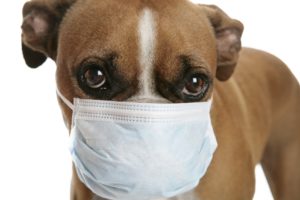What Is Canine Influenza Virus?

There are many causes of kennel cough, both bacterial and viral. Canine influenza virus (CIV) is one of the viral causes of kennel cough. This highly contagious respiratory disease has affected thousands of dogs in the United States. Because CIV is a relatively new virus, most dogs have not been exposed to it before. Dogs of any age, breed, and vaccine status are susceptible to this infection.
How Could My Dog Catch Canine Influenza Virus?
CIV is easily transmitted between dogs through a combination of aerosols, droplets, and direct contact with respiratory secretions. The virus does not survive for a long time in the environment, so dogs usually get CIV when they are in close proximity to other infectious dogs.
Which Dogs Are Prone to Canine Influenza Virus?
Any dog who interacts with large numbers of dogs is at increased risk for exposure. Pet owners should consult their veterinarian for information about the canine influenza vaccine.
What Are the General Signs of Canine Influenza Virus?
While most dogs will show typical signs of kennel cough, but a small percentage of dogs will develop a more severe illness. Signs of canine influenza virus include:
- Coughing
- Sneezing
- Variable fever
- Clear nasal discharge that progresses to thick, yellowish-green mucus
- Rapid/difficult breathing
- Loss of appetite
- Lethargy
Can Dogs Die From Canine Influenza Virus?
If CIV is quickly diagnosed and treated, the fatality rate is quite low. Deaths are usually caused by secondary complications, such as pneumonia. It is important that dogs with CIV receive proper veterinary care.
How Is Canine Influenza Virus Diagnosed?
Veterinarians will typically conduct a thorough physical examination and run a series of tests to diagnose the illness.
How Is Canine Influenza Treated?
Because CIV is a virus similar to the flu in humans, there is no specific antiviral medication available. However, supportive care and appropriate treatment of secondary infections are important. Your veterinarian may advise the following to soothe your dog while the condition runs its course:
- Good nutrition and supplements to raise immunity
- A warm, quiet, and comfortable spot to rest
- Medications to treat secondary bacterial infections
- Intravenous fluids to maintain hydration
- Workup and treatment for pneumonia
Be advised, while most dogs will fight the infection within 10 to 30 days, secondary infections require antibiotics and, in the case of pneumonia, sometimes even hospitalization.
What Should I Do if I Think My Dog Has Canine Influenza Virus?
If you think your dog has canine influenza virus, immediately isolate him or her from all other dogs and call your veterinarian.
Can I Catch Canine Influenza From My Dog?
So far there has been no evidence to indicate that dogs can transmit CIV to humans.
How Can I Help Prevent My Dog From Spreading the Disease?
Any dog infected with CIV should be kept isolated from other dogs for 10 to 14 days from the onset of signs. Dogs are most infectious before signs are apparent, and can continue shedding the virus for approximately 10 days. This means that by the time signs of the illness are seen, other dogs may have already been exposed.
Source: https://www.aspca.org/pet-care/dog-care/canine-influenza-viruscanine-flu
Recent Posts
About Us
Merrimac Valley Animal Hospital had humble beginnings in 1968. Dr. Walter Brown opened the animal hospital in a garage next to his home near the current hospital and operated out of this small space until the current building was built in 1969.
